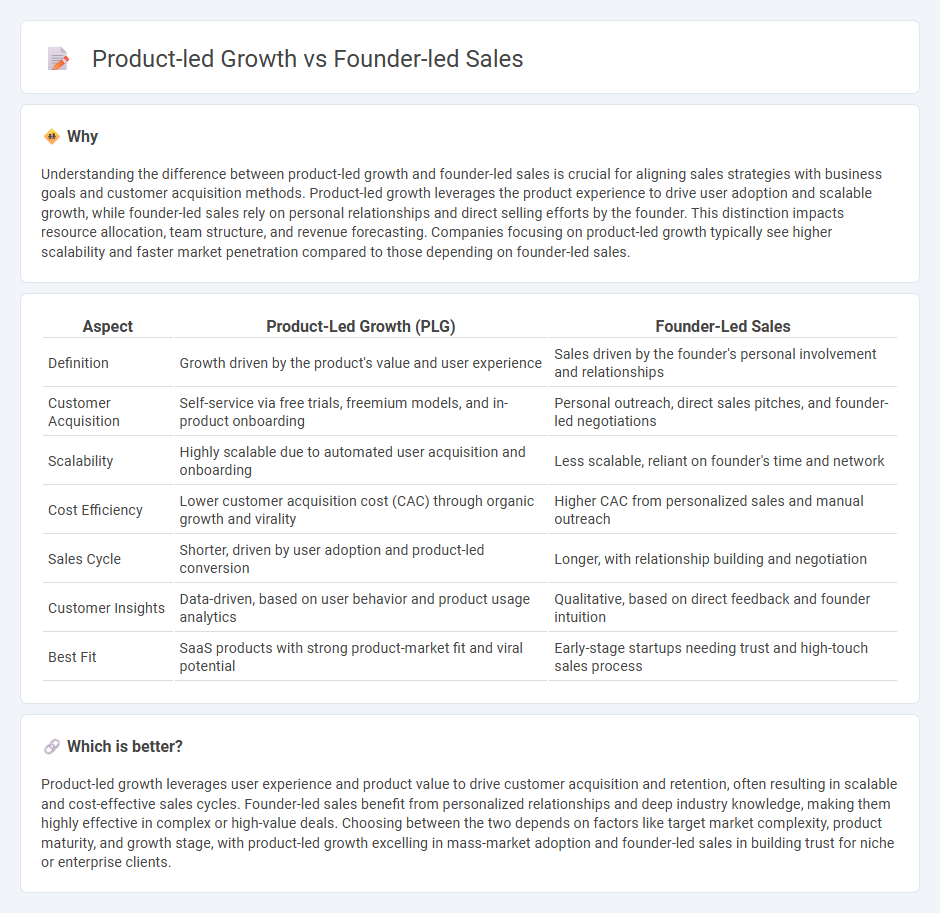
Product-led growth focuses on leveraging the product itself as the primary driver of customer acquisition, retention, and expansion, emphasizing user experience and self-service features. Founder-led sales rely on the founder's deep product knowledge and personal relationships to build trust and close deals, often in early-stage startups or complex markets. Explore how combining these sales strategies can accelerate business growth and customer engagement.
Why it is important
Understanding the difference between product-led growth and founder-led sales is crucial for aligning sales strategies with business goals and customer acquisition methods. Product-led growth leverages the product experience to drive user adoption and scalable growth, while founder-led sales rely on personal relationships and direct selling efforts by the founder. This distinction impacts resource allocation, team structure, and revenue forecasting. Companies focusing on product-led growth typically see higher scalability and faster market penetration compared to those depending on founder-led sales.
Comparison Table
| Aspect | Product-Led Growth (PLG) | Founder-Led Sales |
|---|---|---|
| Definition | Growth driven by the product's value and user experience | Sales driven by the founder's personal involvement and relationships |
| Customer Acquisition | Self-service via free trials, freemium models, and in-product onboarding | Personal outreach, direct sales pitches, and founder-led negotiations |
| Scalability | Highly scalable due to automated user acquisition and onboarding | Less scalable, reliant on founder's time and network |
| Cost Efficiency | Lower customer acquisition cost (CAC) through organic growth and virality | Higher CAC from personalized sales and manual outreach |
| Sales Cycle | Shorter, driven by user adoption and product-led conversion | Longer, with relationship building and negotiation |
| Customer Insights | Data-driven, based on user behavior and product usage analytics | Qualitative, based on direct feedback and founder intuition |
| Best Fit | SaaS products with strong product-market fit and viral potential | Early-stage startups needing trust and high-touch sales process |
Which is better?
Product-led growth leverages user experience and product value to drive customer acquisition and retention, often resulting in scalable and cost-effective sales cycles. Founder-led sales benefit from personalized relationships and deep industry knowledge, making them highly effective in complex or high-value deals. Choosing between the two depends on factors like target market complexity, product maturity, and growth stage, with product-led growth excelling in mass-market adoption and founder-led sales in building trust for niche or enterprise clients.
Connection
Product-led growth leverages user experience and product value to drive customer acquisition and retention, creating organic sales opportunities directly through product usage. Founder-led sales emphasize the founder's deep understanding of the product and market to build trust, tailor messaging, and close high-impact deals. Combining product-led growth with founder-led sales aligns authentic product value with strategic relationship building, accelerating scalable revenue generation.
Key Terms
Founder Involvement
Founder-led sales emphasize direct involvement of the founder in driving customer acquisition, leveraging their vision, relationships, and hands-on approach to build trust and close deals. In contrast, product-led growth relies on the product's inherent value and user experience to drive adoption and expansion with minimal founder intervention. Explore the dynamics of founder engagement in sales strategies to understand which model aligns best with your business goals.
Self-Serve Onboarding
Founder-led sales drive early-stage company growth by leveraging personalized outreach and deep customer insights to tailor onboarding experiences, ensuring high conversion rates and strong initial traction. Product-led growth prioritizes scalable self-serve onboarding, enabling users to experience product value immediately without sales intervention, which enhances user acquisition and retention metrics. Explore effective strategies to balance founder-led sales and product-led self-serve onboarding for optimal business expansion.
Customer Acquisition Strategy
Founder-led sales prioritize direct engagement by leveraging the founder's vision and relationships to drive customer acquisition, often resulting in personalized, high-touch sales interactions suited for complex or high-value products. Product-led growth emphasizes user experience and product adoption as primary drivers, using self-service mechanisms and viral product features to achieve scalable customer acquisition. Explore deeper insights to optimize your customer acquisition strategy effectively.
Source and External Links
Founder-Led Sales Guide: 7 sales tips for early-stage founders - Founder-led sales involves founders actively engaging in sales to build authentic relationships, gain valuable customer feedback to refine the product, and identify upsell and cross-sell opportunities with a more personalized approach.
Founder-Led Sales 101: Everything You Need to Know in 2024 - Founder-led sales is a strategy where startup founders directly handle sales, leveraging their deep product knowledge and passion to build relationships, negotiate deals, and continuously adapt the sales process based on customer feedback.
The Importance of Founder-Led Sales for Startups - HubSpot - Founder-led sales helps early-stage startups stand out by having founders engage directly with clients, using their unique understanding and passion for the product to build credibility, tailor the sales strategy to business goals, and gather critical client feedback for shaping the business.
 dowidth.com
dowidth.com